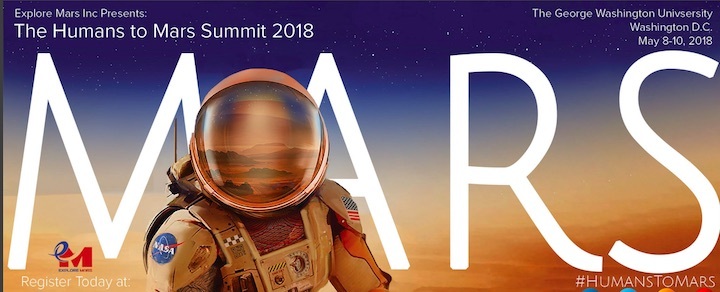Washington, D.C., January 24, 2019: Explore Mars, Inc. and the American Astronautical Society (AAS) are pleased to announce the release of the final report of the Sixth Community Workshop for Achievability and Sustainability of Human Exploration of Mars (AM VI). AM VI, which was held at The George Washington University in Washington, D.C. on August 28-30, 2018, assembled leading experts in the exploration of the Moon and Mars, including scientists, technologists, and policy professionals.
Workshop participants identified and justified those activities that have been proposed for lunar exploration that have the strongest value for development in support of human Mars missions within the next two decades. An additional goal of the workshop was an opportunity for a face-to-face exchange of knowledge between developers of scenarios for the human exploration of Mars with developers of scenarios for further lunar exploration. The AM VI report, along with the reports of the previous five workshops, can be found at - https://www.exploremars.org/affording-mars
“This was an extremely productive workshop,” commented Explore Mars CEO Chris Carberry. “I was pleased how much alignment exists among Mars and lunar advocates. As a result of this workshop, I am very confident that we will be able to build the necessary consensus to return to the Moon and send humans to Mars in the 2030s.”
Specifically, the workshop assessed capabilities proposed for lunar exploration that may feed forward to or support Mars exploration. The workshop utilized two teams that examined transportation systems and operations, as well as surface systems and operations, and produced findings including the following:
Transportation/Propulsion Team: Priority Driving Gaps (Priority Order)
- Long-term cryogenic fluid management
- Lander development (e.g., propulsion/precision, autonomous landing/hazard avoidance)
- Vehicle aggregation (e.g., refueling, refurbishing, checkout)
- Crew health (e.g., radiation, psychosocial)
Surface Operations Team: Strong Feed Forwards (Alphabetical Order)
- Human health and biomedicine
- Power systems
- Rovers
- Surface suits
Secondary Feed Forwards (Alphabetical Order)
- Communication systems
- In-Situ Resource Utilization
- Surface habitats and laboratories
The workshop also outlined several proposed trade studies and recommended findings for NASA as well as suggested National Academy studies, especially to assess in depth the value of in-space resource utilization (ISRU) for sustained lunar and Mars operations.
“The American Astronautical Society is once again pleased to collaborate with Explore Mars on AM VI,” said Executive Director Jim Way. “This event and the final report are already helping inform and guide industry leadership from all sectors on the best next steps toward sustained human space exploration of both the Moon and Mars. We’re glad to be a part of it.”
Explore Mars, the AAS, and our partners are now beginning to plan for the next phase of this program to build on the professional collaboration that we have achieved to date. Joe Cassady of Aerojet Rocketdyne, who served as the Transportation Team co-lead for the workshop, summed it up by stating, “The United States and its partners should begin or accelerate development of these capabilities if the goal of sending humans back to the Moon in the 2020s and on to the surface of Mars in the 2030s is to be achieved.” |
|

